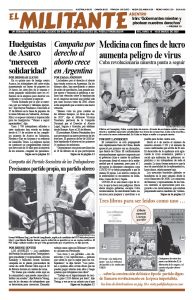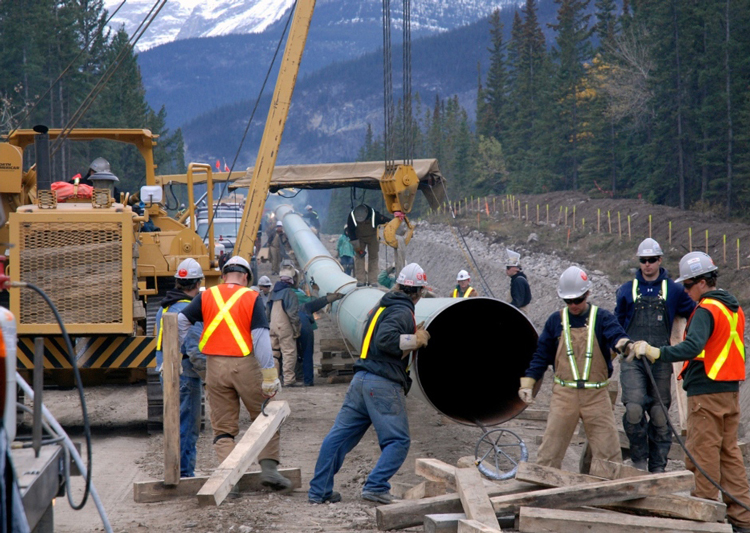MONTREAL — A Feb. 24 raid by dozens of armed Ontario Provincial police on a 18-day-long Tyendinaga Mohawk First Nation camp blocking the Canadian National Railway line near Belleville, between Montreal and Toronto, resulted in a new round of demonstrations and blockades of rail lines and roads around the country.
“The Communist League calls on the trade unions and all supporters of democratic rights to condemn the police raids and arrests, and demands that the police withdraw from the Indigenous people’s territory,” said Pierre-Luc Filion, who along with this worker-correspondent, was one of the two Communist League candidates in the 2019 federal elections. “The RCMP and other police along with the Canadian army have been central to maintaining the oppression of Indigenous people and denying their sovereignty over their land, resources and ability to control their own lives.”
The blockade was set up Feb. 6 in solidarity with a small group of Wet’suwet’en Indigenous people arrested by the Royal Canadian Mounted Police in northwestern British Columbia earlier that day. They had set up a camp blocking a service road, part of an effort to stop the construction of the Coastal GasLink pipeline from Dawson Creek, British Columbia, near the Alberta border, to Kitimat on the west coast where an 18 billion Canadian dollar refinery ($13.5 billion) is being built to process natural gas for transport to Asia.
Canadian National freight rail and Via passenger rail bosses responded to the blockade by shutting down most of their eastern freight and passenger transportation systems. This resulted in the layoff of hundreds of workers and the piling up of freight in rail yards and ports, creating a serious crisis for the Liberal government of Prime Minister Justin Trudeau. The rail bosses also obtained court injunctions to press the government to shut the blockades down.
The unfolding protests have revealed deep divisions among Indigenous people over the development of resources like oil and gas on their territories. Many elected tribal leaderships have signed agreements with pipeline companies and other bosses in exchange for preference in jobs. The actions have also provoked a discussion among both First Nations and other working people on the way forward in the decadeslong fight against the oppression of Canada’s 1.7 million Indigenous people.
Wet’suwet’en people divided
The Wet’suwet’en are a First Nations people in northwestern British Columbia. Like many First Nations they are both ruled by hereditary chiefs and elected band councils. These two bodies are sharply divided over the construction of the pipeline.
All but one of the nine currently serving hereditary chiefs oppose the pipeline. There are four vacant chief positions. Three of those had been filled by women, who supported the pipeline and were stripped of their hereditary titles by the other chiefs.
The Wet’suwet’en Nation hereditary chiefs, and their supporters, maintain they have jurisdiction and authority over 8,500 square miles of traditional territory that sits in the middle of the pipeline’s path. They oppose its construction because they oppose the development and use of fossil fuels.
These chiefs are supported by radical environmentalists such as Extinction Rebellion, anarchists and other middle-class radicals who have been the majority of protesters across the country.
The pipeline and increase in gas exports are vital to Canada’s capitalist class. The total investment is estimated at CA$40 billion, which, according to Ottawa, would be the biggest private investment in Canadian history.
The working class also has an interest in its development, for different class reasons.
All 20 of the elected band councils along the pipeline route support its construction. They have signed agreements with Coastal GasLink to ensure Indigenous people are hired to construct it.
Chief Judy Gerow of the Kitselas band said most of its 700 members support the agreement.
“You can’t ignore the fact that there’s this industry in our backyard, and to not capitalize on it would be a mistake,” Gerow said. “We’ve seen the logging industry die around us. We’ve seen the fishing industry die around us, and our people were typically employed in those industries. It was really hard on the communities and on the families when these jobs disappear.”
At a meeting in Houston, one of the larger towns in the region, some 200 people came out to discuss the pipeline project. According to Canadian Broadcasting Corp., Wet’suwet’en people who came to the meeting said that “they want to see the natural gas pipeline built. They say the project will create well-paid jobs that will bring economic opportunities to their communities.”
The Communist League candidates said in a 2019 election statement that imposing a halt to the development and use of all fossil fuels today is against the interests of the world’s oppressed and exploited. It “amounts to condemning the 1½ billion people without electricity in underdeveloped countries to live without it. Access to electricity is essential for the development of modern industry, agriculture, sanitation, and health care.
“It’s also a precondition for the advance of culture and education,” the CL candidates said. “And the development of an international working-class movement that can lead the fight against imperialist oppression [and] capitalist exploitation.”
The Communist League also calls for workers control of production, including control over CO2 emissions, to protect those on the job and those living near the pipeline, and for widespread development of nuclear-powered electrical generators. The fight to win this would put workers in a better position to utilize all the advances in science to tackle pollution, something that is impossible under capitalist rule.
Jobs: Key question for Native people
One in four Indigenous people in Canada live below the official poverty line, almost double the rate of the rest of the population. The average earnings for First Nations people is almost 40% less than other workers.
In an interview with the Militant, Filion said, “Preferential hiring for Indigenous people is a central demand that the labor movement should fight for to combat the racist discrimination they face. It would draw larger numbers of Natives into the working class and our unions. This would greatly strengthen the unity of working people, strengthen our unions and our fighting capacity.
“The fight for preferential hiring needs to be tied to demanding a massive federally funded public works program, at union-scale wages,” Filion said, “to build the houses, medical clinics, modern water and sanitation systems that Indigenous people — especially those living on reserves — desperately need.”
The blockades and other protests organized in support of the traditional chiefs have said nothing about the burning need for jobs.
Pamela Gabriel-Ferland, a member of the Mohawk First Nation and a social worker, told this worker-correspondent in a discussion in her home in Kanesatake that “after four years’ experience it’s clear that [Trudeau’s call for] ‘reconciliation’ with Indigenous people is just a buzzword. It’s meaningless.”
Pointing to the government’s use of force to dismantle the blockades, she said, “Is this what Trudeau means by reconciliation?”
“Today, there is no party that really has the interests of working people in mind,” she added.
I explained the Communist League’s perspective of working people building a labor party that would champion the needs of all the oppressed and exploited, including those who are Indigenous, and fight to establish a government of workers and farmers.
“It would be great to have a party of our own,” she responded.


